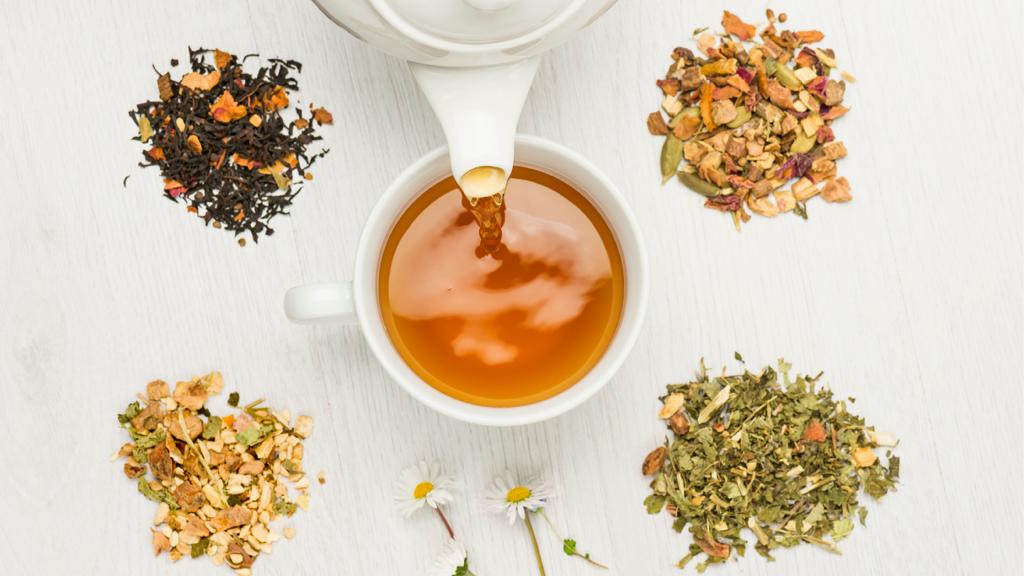6 Powerful Healing Herbs Found in Herbal Teas
Herbal remedies and medicine have been around for centuries. One way that mankind has enjoyed the natural healing benefits of herbs has been in the form of herbal teas.
Unlike regular teas made from green or black tea leaves, herbal teas are made from flowers, spices, roots, herbs, and dried fruits that have amazing healing properties and health benefits. Herbal teas are also vegan, alkaline friendly, and align with a holistic lifestyle.
There’s An Herb for That carries a powerful Blood Tonic Tea that heals the whole body through its toning effect on the circulatory system.
If you’re wondering what to look for in herbal tea? Here is a list of 10 powerful herbs herbal herbs you want in your tea.
1. Bladderwrack

Seaweed has always been used as a supplement in herbal medicine because it is nutrient-packed.
Bladderwrack is a type of seaweed that is rich in vitamins and minerals like calcium, iodine, magnesium, potassium, sodium, zinc, and vitamins A and C., As well as being high in fiber.
It is also high in phytochemicals like phlorotannins and fucoxanthin, reducing oxidative stress – an imbalance between free radicals and antioxidant levels in the body.
Besides being a nutrient-rich plant, bladderwrack has been known to heal and regulate thyroid function and inflammation naturally.
Bladderwrack contains high iodine levels, which supports thyroid health by producing the thyroid hormones triiodothyronine and thyroxine. These hormones help to regulate metabolism and support neurological development.
Due to Bladderwrack being rich in antioxidants like phlorotannins and fucoxanthin, it is known to have anti-inflammatory effects.
Phlorotannins and fucoxanthin have high antioxidant activity and the ability to scavenge free radicals – harmful compounds that can damage cells and lead to chronic disease and premature aging.
Bladderwrack may also be a herbal remedy for reduced tumor growth, blood sugar levels, and the risk of heart disease.
A 2019 study found that out of 45,406 women, 12% decreased the risk of heart disease with daily consumption of seaweed.
2. Dandelion

Although you may think of dandelions as the annoying “weeds” in your yard, dandelion root and other “weeds” have been commonly used in herbal medicines for years as a way to heal naturally.
Dandelion tea is usually made from an infusion of the plant’s leaves or roasted dandelion roots.
Dandelion tea is known chiefly as a herbal remedy for digestive health and weight loss. Historically herbalists have used the root as a holistic alternative to improve appetite, soothe digestion and relieve constipation.
Dandelion is a diuretic when it comes to weight, meaning it increases urine output and can help with bloating and water weight. It has also been known to help with urinary tract infections.
A recent Korean study suggests that dandelion may have similar effects on the body as weight loss drugs like Orlistat.
Some of the roots more extensive claims include promoting liver health. In herbal medicine, dandelion root is a natural “liver tonic.” According to a 2017 study, the polysaccharides in dandelions may benefit liver function.
Another way dandelion can be used as a herbal remedy is to fight cancer. A 2011 Candian study showed that the root extract induces cell death in melanoma cells, impacting non-cancerous cells. The same has been said about the root’s effect on pancreatic cancer cells.
3. Burdock root

Burdock root is a vegetable native to northern Asia and Europe; it is now found in the U.S, growing like a weed. Burdock root has been used in holistic medicine for centuries to treat many different health issues.
Traditionally, Burdock root was commonly used as a diuretic and digestive aid.
However, today researchers have found numerous potential uses and health benefits associated with Burdock root. These benefits include high antioxidants, cancer-inhibiting, lymphatic system draining, and blood purifying.
Burdock has been shown to contain powerful antioxidants, including quercetin, luteolin, and phenolic acids. These antioxidants protect cells in the body from damage due to free radicals.
Burdock may also have the potential to inhibit certain types of cancer. European physicians of the Middle Ages used burdock to treat cancerous tumors.
Recent research has found that burdock root significantly interfered with cancer cell growth, especially with cancers like pancreatic carcinoma.
Today, many herbalists say burdock root can stop cancer cells from metastasizing, making it a potential natural cancer treatment.
Burdock root helps induce lymphatic drainage and detoxification. The lymphatic system is the body’s inner “drainage system,” made up of blood vessels and lymph nodes that carry fluids from tissues around the body into the blood and vice versa.
Making your lymphatic system stronger can help the body ward off disease and severe health issues.
Burdock root is known to remove toxins from the blood due to the active ingredients in the root system. These ingredients can remove toxins like heavy metals from the bloodstream and increase blood circulation on the skin’s surface, Strengthening your lymphatic system.
4. Ginger

Ginger is a flowering plant native to Southeast Asia and one of the healthiest spices in the world. The root of the plant is the part commonly used as a spice, which with refer to as ginger or ginger root.
Ginger root has many medicinal properties and health benefits, including anti-inflammatory, cancer-inhibiting, infection-fighting, and cholesterol-lowering.
Ginger contains gingerol, the main bioactive compound in the plant; it is responsible for the root’s healing properties. Gingerol also has anti-cancer properties, but more studies are needed.
Gingerol has powerful anti-inflammatory and antioxidant properties, which may help reduce oxidate stress.
Ginger is a natural remedy for high cholesterol.
High LDL (bad) cholesterol levels are linked to an increased risk of heart disease. What we eat strongly affects cholesterol levels. There is some evidence that ginger can significantly reduce LDL cholesterol levels.
Ginger also helps fight harmful bacteria and viruses by inhibiting their growth.
Besides the benefits mentioned above, ginger has improved brain function in people with Alzheimer’s disease. It also reduces menstrual pain, nausea, and joint pain from osteoarthritis.
5. Rooibos

Rooibos tea has been gaining popularity in recent years as a tasty with many medicinal properties.
Rooibos is made using leaves from the scrub of a bush native to Southern Africa. The herb is also known as red tea or red bush tea for its red-brown color achieved through fermentation.
Rooibos is packed with antioxidants, low in tannins, and caffeine-free. This herb has also been linked to naturally boosting heart health and reducing cancer risk.
The herb contains high levels of aspalathin, luteolin, and quercetin, health-promoting antioxidants. These antioxidants can kill cancer cells and even prevent tumor growth.
The antioxidants in the tea are also linked to a healthier heart. Rooibos lowers LDL (bad) cholesterol and raises HDL (good) cholesterol to the risk of heart disease.
Rooibos has low tannin levels. Tannins can interfere with the absorption of certain nutrients, like iron.
The tea also contains no oxalic acid, unlike green and black tea. Consuming high amounts of oxalic acid can increase the risk of kidney stones and disease.
6. Echinacea

Echinacea is a group of flowering plants in the daisy family and native to North America. The petals, stems, and roots are used in tablets, tinctures, extracts, and teas.
Echinacea is high in antioxidants and may offer several health benefits such as lowing blood sugar and positively affecting the immune system.
Echinacea plants contain the active compounds alkamides, further enhancing antioxidant activity. Alkamides can renew worn-out antioxidants and help antioxidants reach molecules prone to oxidative stress.
Some of the antioxidants in Echinacea are flavonoids, cichoric acid, and rosmarinic, which also help defend the body against oxidative stress.
The flower is best known for its positive effects on the immune system. Several studies have found that the plant may help the immune system fight off infections and viruses, which can help you recover faster from illness.
Echinacea is a known herbal remedy for high blood sugar.
High blood sugar can lead to health issues like type 2 diabetes and heart disease. Echinacea purpurea extract has been shown to suppress enzymes that digest carbohydrates, reducing the amount of sugar entering your blood.
Where to find these herbs:
Herbal medicine and remedies are excellent resources for healing ourselves and living a holistic lifestyle naturally.
Herbal medicine is the original medicine, and with today’s science, we see the validity of century-old claims and remedies being proven.
Herbal teas come in various delicious flavors and are one of the best ways to benefit from these herbs’ health-promoting effects.
So if you are looking to include more vitamins and minerals into your diet, try our Blood Tonic Tea. An Herb for That’s Blood Tonic Tea is a proprietary blend of herbs, including burdock, dandelion, and bladderwrack. This blend works on improving the circulatory system by enlarging the arteries to improve blood function.




Leave a comment